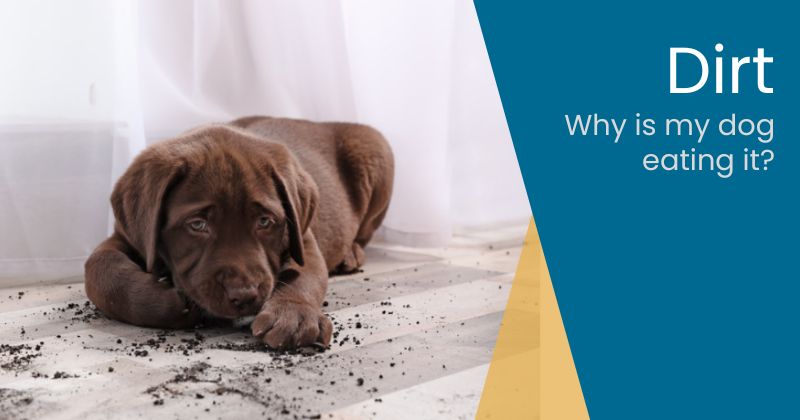
If you’ve caught your dog munching on dirt, you’re likely concerned about what’s causing this unusual behavior. Dogs have quirky habits, but eating dirt is one that can puzzle even the most experienced pet owners. While it may seem strange, this behavior is more common than you might think. At Conyers Animal Hospital, we’re here to help you navigate these moments of uncertainty and provide guidance on when to seek care. Let’s dive into why your dog might be eating dirt and what this behavior could indicate about their health. If you’re concerned, feel free to give us a call at (770) 483-1551 or request an appointment.
There are several reasons why dogs engage in dirt-eating, or pica, which is the scientific term for eating non-food items. In many cases, this behavior is connected to underlying causes that may range from mild to serious. Let’s break down some of the most common reasons a dog might be eating dirt.
If your dog isn’t getting enough essential nutrients from their diet, they may instinctively seek out minerals from other sources, including dirt. This is particularly true if your dog’s food is lacking in minerals like iron, calcium, or potassium. Dogs that consume commercial kibble might not always receive the full spectrum of nutrients they need, especially if the food is low-quality or not suited to their life stage. If your dog is eating dirt and you suspect a nutritional imbalance, it may be time to evaluate their diet. Working with your veterinarian to determine if a dietary change is needed can help address this behavior.
Dogs often engage in unusual behaviors, such as eating dirt, when they’re bored or experiencing stress. A lack of mental and physical stimulation can lead to destructive or strange actions, including the consumption of non-food items. For some dogs, eating dirt is a way to pass the time or relieve anxiety. If you suspect that boredom or stress is contributing to your dog’s dirt-eating habits, consider increasing their exercise and playtime. Engaging them in interactive toys or puzzle games can provide the mental stimulation they need to reduce stress and curb undesirable behaviors.
In some cases, a dog eating dirt may indicate an underlying medical condition. Gastrointestinal issues, such as inflammatory bowel disease (IBD) or other digestive problems, can lead dogs to eat dirt in an attempt to soothe their stomachs. Additionally, dogs with anemia or other blood disorders may seek out soil because they’re craving iron or other nutrients they lack. If your dog is frequently eating dirt and showing other signs of illness, such as lethargy, weight loss, or vomiting, it’s essential to consult with your veterinarian. A full evaluation can help determine if there’s an underlying health issue that needs to be addressed.
Behavioral factors and the environment can also play a role in why your dog is eating dirt. From behavioral quirks to environmental exposure, several scenarios may contribute to this behavior.
Eating dirt can sometimes be a learned behavior from other pets. If one animal eats dirt regularly, others may mimic it, especially curious puppies. As dogs mature, they often outgrow this habit and learn what’s appropriate to eat. Proper training and positive reinforcement can help discourage dirt-eating. If your dog is copying another animal, monitoring their outdoor time more closely may help break the cycle.
Dogs use their mouths to explore the world around them, and dirt is just one of many objects they may sample. Sometimes, dirt eating is simply part of their natural curiosity, especially if the soil has an interesting texture, smell, or even taste. While a few tastes of dirt may be harmless, regular consumption could indicate a larger issue. Monitoring your dog’s behavior and discouraging unnecessary dirt consumption is key. If curiosity seems to be the driving factor behind their dirt-eating, ensure that they have plenty of appropriate objects to chew on, such as toys or treats, to satisfy their need to explore.
Environmental factors can also lead to dirt-eating, especially if your dog has access to fertilized or chemically-treated soil. Ingesting treated dirt can pose health risks. If you suspect this is the cause, ensure your yard is free of harmful substances. Use pet-safe fertilizers and limit your dog’s access to areas with chemical treatments to prevent exposure to toxins.
While dirt-eating may seem relatively harmless in small amounts, it can pose health risks to your dog if the behavior becomes frequent or excessive. Soil often contains bacteria, parasites, and harmful chemicals that can cause health issues for your pet. Below are some of the risks associated with dirt-eating.
Soil is a common source of parasites, such as roundworms, hookworms, and giardia, which can infect your dog if ingested. These parasites can lead to gastrointestinal problems, including diarrhea, vomiting, and weight loss. Regular dirt consumption increases your dog’s chances of contracting these parasites. If your dog eats dirt and begins showing signs of illness, such as vomiting or diarrhea, contact your veterinarian. They can perform a fecal test to determine if parasites are present and provide the appropriate treatment.
Dirt, especially when consumed in large quantities, can cause blockages in your dog’s intestines. This can be a serious medical emergency requiring surgery to remove the obstruction. Signs of an intestinal blockage include vomiting, lack of appetite, abdominal pain, and difficulty defecating. If you notice any of these symptoms after your dog has eaten dirt, it’s critical to seek veterinary care right away. Addressing the issue early can prevent more severe complications.
Depending on where your dog is eating dirt, they could be exposed to toxic substances, such as pesticides, herbicides, or fertilizers. These chemicals can be harmful to your dog and lead to poisoning. Symptoms of poisoning may include drooling, vomiting, tremors, or seizures. If you suspect that your dog has ingested contaminated dirt, contact your veterinarian immediately. Fast intervention can help reduce the risk of serious harm.
Managing your dog’s dirt-eating habits involves a combination of addressing the root cause and discouraging the behavior. Here are some strategies to help you prevent your dog from eating dirt.
While occasional dirt-eating may not always signal a severe issue, consistent behavior could be linked to something more concerning. At Conyers Animal Hospital, we’re dedicated to helping you understand your dog’s behavior and providing the necessary care to address any health concerns. If you’re worried about your dog eating dirt, call us at (770) 483-1551 or request an appointment. Together, we can ensure that your dog stays healthy and happy!
Closed from 1-2pm daily for lunch
*Saturday Walk-ins available on a first-come, first-served basis. Wait times vary, and you may be turned away if we reach capacity.


